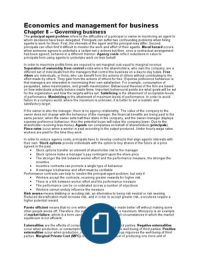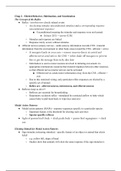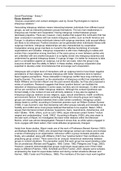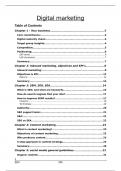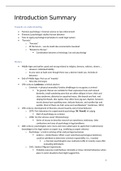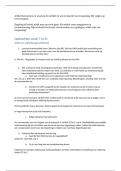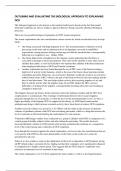Economics and management for business
Chapter 8 – Governing business
The principal-agent problem refers to the difficulties of a principal or owner in monitoring an agent to
whom decisions have been delegated. Principals can suffer two confounding problems when hiring
agents to work for them. First, the interests of the agent and the principal may differ. Second,
principals can often find it difficult to monitor the work and effort of their agents. Moral hazard occurs
when someone agrees to undertake a certain set o actions but then, once a contractual arrangement
has been agreed, behaves in a different manner. Agency costs reflect reductions in value to
principals from using agents to undertake work on their behalf.
In order to maximize profits firms are required to set marginal cost equal to marginal revenue.
Separation of ownership from control exists where the shareholders, who own the company, are a
different set of individuals from the managers that control the business on a day-to-day basis. Free
riders are individuals, or firms, who can benefit from the actions of others without contributing to the
effort made by others. They gain from the actions of others for free. Expense preference behaviour is
that managers are interested in maximizing their own satisfaction. For example, consumption of
perquisites, sales maximization, and growth maximization. Behavioural theories of the firm are based
on how individuals actually behave inside firms. Important behavioural points are what goals will be set
for the organization and how the targets will be set. Satisficing is the attainment of acceptable levels
of performance. Maximizing is the attainment of maximum levels of performance. In order to avoid
failure in a complex world, where the maximum is unknown, it is better to set a realistic and
satisfactory target.
If the owner is also the manager, there is no agency relationship. The value of the company to the
owner does not change with the behaviour of the manager, the financial benefits are being paid to the
same person. when the owner sells half their stake in the company, and the owner-manager displays
expense preference behaviour, then the potential buyer will value the company lower. Due to the
shareholder receiving less money. Agents run companies on behalf of shareholders (principals).
Piece rates occur when a worker is paid according to the output produced. Under hourly wage rates,
workers are paid for the time they work.
In order to reduce agency costs, principals have to develop contracts that align agents’ interests with
their own. Stock options provide individuals with the option to buy shares in the future at a price
agreed in the past.
Stock options transfer an element of shareholder risk to the manager
Stock options make a manager’s pay contingent upon the share price
The stronger the link between worker effort and the performance measure, the stronger the
incentive
Incentive contracts can promote a single type of behaviour
A manager’s behaviour and effort must be verifiable
Performance contracts can help to resolve the principal-agent problem, but only if:
Workers accept the contracts, receiving greater rewards for higher risk
There is a link between worker effort and the performance measure
The performance can be co-ordinated across a number of objectives
Workers cannot unduly influence the measure
Risk averse means disliking or avoiding risk, an alternative to being risk neutral or risk seeking.
Reduced diversification must increase risk, and in order to accept greater risk, executives require a
higher potential reward.
Pareto efficient means that no one within an economy can be made better off without making some
other people worse off. Therefore, the well-being of society is at a maximum. Monopoly is an example
of market failure, which is a term used by economists to cover all circumstances in which the market
equilibrium is not efficient.
Externalities are the effects of consumption, or production, on third parties. Negative externalities
occur when production, or consumption, by one group reduces the well-being of third parties. Positive
externalities occur when production, or consumption, by one group improves the well-being of third
parties. Marginal Private Cost (MPC) is the cost to the individual of producing one more unit of
Chapter 8 – Governing business
The principal-agent problem refers to the difficulties of a principal or owner in monitoring an agent to
whom decisions have been delegated. Principals can suffer two confounding problems when hiring
agents to work for them. First, the interests of the agent and the principal may differ. Second,
principals can often find it difficult to monitor the work and effort of their agents. Moral hazard occurs
when someone agrees to undertake a certain set o actions but then, once a contractual arrangement
has been agreed, behaves in a different manner. Agency costs reflect reductions in value to
principals from using agents to undertake work on their behalf.
In order to maximize profits firms are required to set marginal cost equal to marginal revenue.
Separation of ownership from control exists where the shareholders, who own the company, are a
different set of individuals from the managers that control the business on a day-to-day basis. Free
riders are individuals, or firms, who can benefit from the actions of others without contributing to the
effort made by others. They gain from the actions of others for free. Expense preference behaviour is
that managers are interested in maximizing their own satisfaction. For example, consumption of
perquisites, sales maximization, and growth maximization. Behavioural theories of the firm are based
on how individuals actually behave inside firms. Important behavioural points are what goals will be set
for the organization and how the targets will be set. Satisficing is the attainment of acceptable levels
of performance. Maximizing is the attainment of maximum levels of performance. In order to avoid
failure in a complex world, where the maximum is unknown, it is better to set a realistic and
satisfactory target.
If the owner is also the manager, there is no agency relationship. The value of the company to the
owner does not change with the behaviour of the manager, the financial benefits are being paid to the
same person. when the owner sells half their stake in the company, and the owner-manager displays
expense preference behaviour, then the potential buyer will value the company lower. Due to the
shareholder receiving less money. Agents run companies on behalf of shareholders (principals).
Piece rates occur when a worker is paid according to the output produced. Under hourly wage rates,
workers are paid for the time they work.
In order to reduce agency costs, principals have to develop contracts that align agents’ interests with
their own. Stock options provide individuals with the option to buy shares in the future at a price
agreed in the past.
Stock options transfer an element of shareholder risk to the manager
Stock options make a manager’s pay contingent upon the share price
The stronger the link between worker effort and the performance measure, the stronger the
incentive
Incentive contracts can promote a single type of behaviour
A manager’s behaviour and effort must be verifiable
Performance contracts can help to resolve the principal-agent problem, but only if:
Workers accept the contracts, receiving greater rewards for higher risk
There is a link between worker effort and the performance measure
The performance can be co-ordinated across a number of objectives
Workers cannot unduly influence the measure
Risk averse means disliking or avoiding risk, an alternative to being risk neutral or risk seeking.
Reduced diversification must increase risk, and in order to accept greater risk, executives require a
higher potential reward.
Pareto efficient means that no one within an economy can be made better off without making some
other people worse off. Therefore, the well-being of society is at a maximum. Monopoly is an example
of market failure, which is a term used by economists to cover all circumstances in which the market
equilibrium is not efficient.
Externalities are the effects of consumption, or production, on third parties. Negative externalities
occur when production, or consumption, by one group reduces the well-being of third parties. Positive
externalities occur when production, or consumption, by one group improves the well-being of third
parties. Marginal Private Cost (MPC) is the cost to the individual of producing one more unit of


